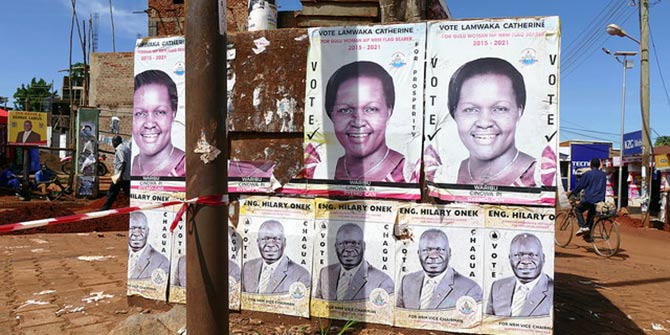Across Kenya, Malawi and Zambia, political candidates often attempt to buy the votes of the most socio-economically deprived communities. But new research from Prisca Jöst and Ellen Lust argues that social cohesion in these communities are instrumental in determining the levels of support for candidates who attempt to buy their voters.
Many scholars and development specialists argue that vote-buying – or the exchange of money or other goods for votes – undermines the provision of public goods. Vote-buying is thus seen as a significant problem amongst the poorest in Africa. Votes from the lowest-income earners may be cheaper to buy, but these groups could also benefit most from better service provision for their communities. Thus, many activists, practitioners and researchers support anti-vote-buying campaigns that caution African voters to refrain from selling their votes to political candidates.
Yet do the lowest-earning groups see candidates who give such handouts as less likely to provide future services? We use a Governance and Local Development Institute survey to explore this question. We ask low-income voters in Kenya, Malawi and Zambia if they expect candidates who give money or goods during election time to provide services once in office. The results highlight that the relationship between vote-buying and service provision is more complicated than most think.
Two competing views of electoral handouts
There are two views of election handouts and public service delivery: One that understands handouts as vote-buying and another that sees it as a signal of credibility. Most scholars subscribe to the first view, describing handouts as the immediate, targeted exchange in which voters receive material goods instead of future services. Eric Kramon puts forward an opposing argument, that these handouts can signal credibility to the voters. His study suggests poor Kenyans are more likely to support vote-buying candidates because they expect them to be more likely to provide future services.
Our study tests both views. We first asked low-income citizens in Kenya, Malawi and Zambia whether vote-buying is common in their community and whether they think it is morally acceptable. We find that experiences with vote-buying vary with the social ties in the community. In communities where most people know each other (i.e., socially dense communities), residents report handouts are both more common and morally acceptable than in communities where only a few people know each other (i.e., less socially dense communities).
Importantly, the socially dense communities are also the ones with inferior service provision – where future service provision ultimately matters more. Our data shows that 88% of residents surveyed in communities with strong social ties do not have access to electricity, compared to only 48% in those communities with less dense social ties.
How expectations over service provision vary with community ties
We also run a survey experiment in which we manipulate whether respondents hear a description of a candidate who hands out money, clothes or other material goods, or conversely, one who does not engage in vote-buying during a campaign. We ask respondents whether they expect the given candidate to improve access to healthcare once elected.
The survey experiment helps us to get around the problem of social desirability bias – that citizens may respond with what they think is socially desirable, even if not true. This approach does not allow us to measure individuals’ actual experience, but we believe expectations are very likely to reflect previous experiences. Moreover, expectations are important in and of themselves.
We find that respondents do not expect much from candidates who give out money during the campaign. Citizens in all communities are less likely to think that those candidates will deliver future services, compared to candidates who do not give monetary handouts.
Surprisingly, however, we also find that expectations of those candidates who do not give monetary handouts vary with the social ties in the community. In less dense communities, voters understand these handouts to be an exchange for their votes, rather than future services. They are also less likely to support vote-buying candidates. By contrast, in socially dense communities, voters believe that no candidates will provide future services, regardless of whether they engage in vote-buying or not. They are therefore more likely to say they would support vote-buying candidates.
Improving politicians’ responsiveness
Our research underlines that vote-buying is a targeted exchange of money and gifts for votes. The poor do not expect much after election day from those who give out money regardless of the community context. Yet, in communities where social ties are dense and state-provided services are inferior, voters believe that those who do not engage in vote-buying are no better than the candidates who do.
This study points to several important areas of research. First, it finds that social context – in particular, the density of social ties in the community – shapes perceptions and experiences with vote-buying. Consequently, future work will need to focus more on the contextual effects when studying support for vote-buying candidates. Second, we emphasise that the expectations of those who do not give handouts change depending on the community context. Previous work has only implicitly considered candidates who do not engage in vote-buying. Nevertheless, we will need to examine citizens’ perceptions of those candidates who do not give handouts, more explicitly, in the future.
Finally, we also draw important policy implications from this work. Our study shows that citizens in socially dense communities where service provision is inferior do not expect any candidates to provide services to their communities. In fact, some small banknotes and gifts are “the only thing that they can get out of the elections.” International donors and organisations who aim to end vote-buying and strengthen democracy in Africa should therefore direct their efforts towards improving politicians’ responsiveness and service provision in marginalised communities more specifically.
Photo: GCIS, licensed under CC BY-ND 2.0




